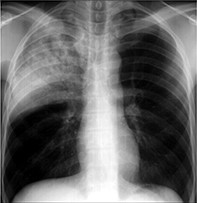Peer Reviewed
Feature Article Infectious diseases
Community-acquired pneumonia in adults
Abstract
The recommended empirical therapy in adults for the common condition community acquired pneumonia is combination therapy with a narrow spectrum beta lactam antibiotic, to treat typical pathogens, and a macrolide antibiotic or doxycycline, to treat atypical pathogens.
Key Points
- Community-acquired pneumonia (CAP) is defined as pneumonia occurring in an immunocompetent patient who has not been in hospital for at least 14 days.
- CAP can be difficult to differentiate clinically from many other illnesses, the most common being viral respiratory tract infections. Chest x-ray infiltrate is the feature that best identifies patients as having pneumonia.
- Patients with normal chest x-rays are unlikely to benefit from taking antibiotics.
- Features of CAP that suggest the need for hospitalisation are severe breathlessness, confusion, inability to maintain oral intake, hypotension, hypoxia and multilobar or bilateral changes on chest x-ray.
- Treatment recommendations for CAP are controversial but existing Australian guidelines to use combination antibiotic therapy aimed at typical and atypical pathogens are appropriate.
Purchase the PDF version of this article
Already a subscriber? Login here.

